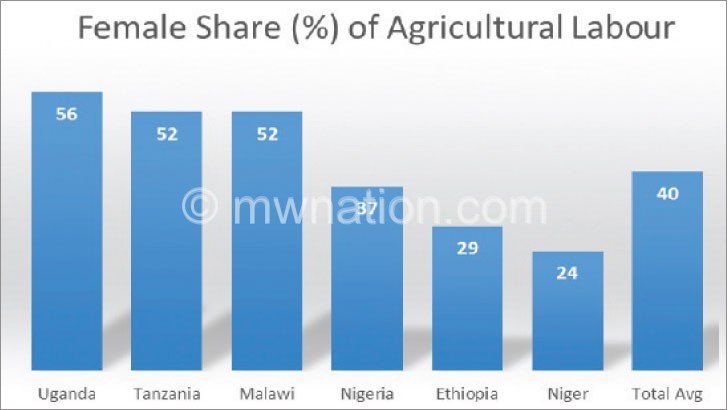Gender gap costs mw k80bn annually
A new joint study by United Nations Development Programme and United Nations Environment Programme (Undp-Unep) has put Malawi’s total cost of gender gap in the productivity output of women in the agriculture sector at a staggering $110million (about K80.3 billion) a year.
Last year, the United Nations (UN) Women estimated that Malawi loses around K60 billion each year due to a widening gender gap in the sector.
But by closing the gender gap, the county could increase its crop production by over 7.3 percent and thereby increasing agriculture gross domestic product (GDP) by $90 million (about K57 billion) UN data shows.
Agriculture is the engine of Malawi’s economy. It employs about 80 percent of the workforce and contributes over 80 percent of foreign exchange earnings.
The sector also accounts for 39 percent of gross domestic product (GDP) and contributes significantly to national and household food and nutrition security. More than 85 percent of rural households derive their livelihoods from agriculture.
The study titled Cost of the Gender Gap in Agricultural Productivity carried out in three African countries Malawi, Uganda and Tanzania has ranked the country poorly as far as gender disparity in farming is concerned.
Malawi is trailed by Tanzania whose estimated cost is $105 million and Uganda at about $67 million.
The widening gender gap in the country means some 238 000 people are denied job opportunities to reduce poverty and improve their malnutrition since majority of poor women depend on agriculture as a source of income and food for daily consumption.
Meanwhile, the study has stirred fresh calls for policy reviews from experts including UNDP and United Nations Environment Programmes (Unep), and gender activists) to save the situation.
David Smith who is Africa in-charge of poverty and Environment Initiative at UNDP-Unep challenged African governments to step up efforts aimed at closing the gender gap, which he described as a ‘potential killer’ for African’s food security.
“The surveyed countries need to come up with strong mechanisms to mitigate the challenges affecting women to effectively participate in agricultural productivity if they are to meet the UN development goals especially the goals to eradicate poverty and fighting malnutrition at the grassroots levels,” said Smith when he presented the report in Kampala, Tanzania.
The joint study says poor access to finance, application of out-dated technologies in agriculture sector, cultural (such as poor access to land for commercial farming and market), environmental and poor infrastructure and bargaining power for agricultural produces are major obstacles which need to be worked on by policy-makers if women are to increase their labour productivity in agricultural sector.
The report reads in part: “Our analysis finds that women’s lower access to farm labour is one of the vital constraints contributing to the gender gap in Malawi and Tanzania.”
“Despite agriculture playing a vital role in the socio-economic development of the country, Malawi’s agricultural productivity is capsizing and renders its 6.5 million people—nearly 40 percent of the population—food insecure.”
The country has been rolling in famine since 2001 due to terrible effects of climate change. This year in April President Peter Mutharika declared a state of national disaster caused by prolonged dry spells and floods during the 2015/16 season.
This year, more than 6.5 million people, a majority of them women and children, are in desperate need of food help.
However, women activist Faith Phiri has since called for systematic integration and enforcement of gender-related policies in agriculture.
“It’s not that the country does not have gender policies in agriculture; it has but they lack enforcement and political will to allocate adequate resources to women in the sector,” said Phiri who is also the executive director of Girls Empowerment Network (Genet-Malawi).
She said with the extent of hunger and financial burden the country is experiencing, there is a need to invest in girls and women to ensure their active participation in agricultural productivity.
“Throughout years, hunger and poverty have a female face in Malawi. Women have poor access to land and agricultural resources such as subsidised fertiliser and seeds,” she said, adding that if women had the same access to productive resources as men, they could increase yields.





